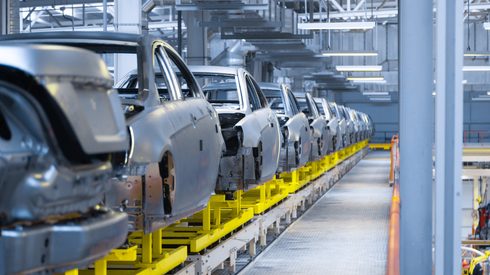The supply chain blockages that began with the onset of the Covid-19 pandemic continued, compounded by labor shortages that have exacerbated the delays in docking of vessels and unloading material. These problems were enough to deter buyers from accepting attractive overseas offers, because they increased the all-in cost, market sources told Fastmarkets.
Transportation costs for steel and other metals have increased significantly over the past two years due to infrastructure constraints, according to Anton Posner, chief executive officer at Mercury Resources, a global supply chain and logistics management company.
“The increase [from two years ago] depends on the region, but ranges from 25% easily up to 50% on average,” Posner told Fastmarkets.
Several market participants said that they were not considering offers of hot-rolled coil from foreign shores, even when the offers were at a $10-per-hundredweight discount to the US domestic spot price.
“Every port, they’re all jammed up,” a distributor source said. “We’ve got material that has been unloaded, and is sitting on a dock, but we can’t access it. It has basically been held hostage for more than a month. Is there a price good enough to repeat that? Not for me – I’ll take my chances with domestic [material].”
Fastmarkets’ fortnightly price assessment for steel hot-rolled coil, import, ddp Houston was $1,080-1,160 per short ton ($54-58 per cwt) on May 25, down by 14.50% from $1,260-1,360 per ton on May 11.
The congestion affected ports across the country, sources said. A West Coast-based importer said that he had to wait until mid-May to unload material from a vessel that had arrived outside the Port of Los Angeles at the beginning of February.
“Earlier, there was a boat that arrived in December, but I did not get the steel until the first week of April,” the importer said.
A rebar importer in Florida had similar sentiments. “Material flow through ports is very difficult,” he said. “Some of the products now cost 400% more to import than two or three years ago.”
“There are labor shortages everywhere in the country, and undocking takes double the time,” he added, referring to imports into the port of Tampa Bay. “My logistics manager is pulling his hair out [in frustration].”
The port of Houston is the largest steel port complex in North America and the largest breakbulk gateway in the United States, whereas the Port of Los Angeles is the busiest container port in North America, according to the ports’ websites.
The port of Tampa Bay handles a wide variety of breakbulk cargoes, including steel, its website says.
Flat-rolled steel and many other steel products are shipped breakbulk, sources said.
The decline in domestic hot band prices also gave pause to those who traditionally buy from countries such as South Korea or Turkey, some importers said.
Fastmarkets’ daily steel hot-rolled coil index, fob mill US, was most recently calculated at $62.04 per cwt ($1,240.80 per ton) on May 27, down by 0.29% from $62.22 per cwt on May 26 and by 5.28% from $65.50 per cwt a week earlier.
The domestic HRC index had fallen to a recent low of $49.26 per cwt on February 18 but recovered after Russia’s invasion of Ukraine, going as high as $75.65 per cwt on April 8. Some sources speculated that domestic spot prices would fall further in the coming weeks before finding a floor.
In April, 2.48 million tonnes of steel arrived in the US, down by 11.75% from 2.81 million tonnes in March, but up by 3.36% from 2.40 million tonnes in April 2021, according to preliminary US Census Bureau data released on May 24.
Imported hot-rolled sheet shipments dropped by 25.34% month on month in April and fell by 11.72% year on year.






